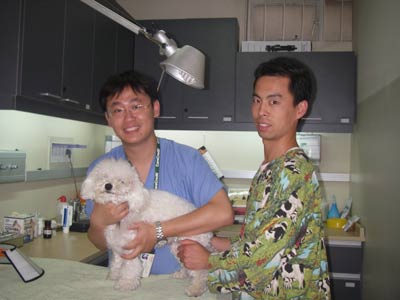In China, feral animals, especially cats, may carry rabies. The China Daily reported in October 2006 that rabies killed more people than any other infectious disease for the fifth consecutive month. The newspaper said: "In September there were 318 deaths caused by rabies while 393 people were reported bitten by rabid animals."

Because of these statistics Ms. Peng is bent on informing the public about transmittable diseases and how animals play a role in this. "A great deal of my work is education," Ms. Peng said. "I think many foreigners come here and just assume that the situation is the same as their home countries. But unlike Australia, Europe, Canada and the USA, here in China rabies is still a problem. China, like other parts of the emerging world: Africa, India, Indonesia – has many kinds of transmittable diseases that are eradicated or extremely rare in the developed world."
Significantly, Ms. Peng has turned this problem into an asset: "Vets from developed countries come here as part of an exchange program so that they can see first hand cases of diseases like rabies. We are giving them the opportunity for real experiences, and they in turn help our students with other aspects of veterinary medicine. Our exchanges last from 3 months to three years."
Her hospital also has many posters and free information concerning rabies, importing pets into China, registering animals, and animal health. "The Chinese government rewards any pet owners who register their dogs: they get a free rabies vaccine at designated, licensed clinics and hospitals. We also provide thorough examinations, neuter/spay services, dental services, and we have an in house lab as well as a large x-ray machine. We can examine an animal, do his blood work or culture or check an x-ray immediately. This saves the owner from running around to many places and saves the animal from any additional suffering," Ms. Peng said.
She pointed out that it's very important to take your pets to places where the vaccines are valid and the services are professional. "Vaccines are classified as controlled drugs. Clinics and hospitals must be clearly designated to dispense these substances. The general public should not just assume that it is possible to walk in and receive an injection that is safe, not out of date and correct, whether it be for animals or humans. Unfortunately, anywhere in the world unethical people and practices exist."
Mary Peng can be trusted and her bi-lingual staff respects and adores her along with the clients and their pets. She knows everyone who walks through the door by name. And although the services at her hospital are not cheap, it's evident that Ms. Peng is not in this business to make a fast buck.
Clearly, she loves animals and wants them all to be healthy, safe and comfortable. Her hospital supports a variety of charitable causes: the Animal Disaster Relief Fund for victims of the Sichuan earthquake, adoption services for kittens born in the Community Cats: Trap/Neuter/Return Program, free vaccinations for registered dogs and her lobby supplies a plethora of free information to help pet owners to keep their beloved animals happy and healthy.
Address: The International Center for Veterinary Services, Kent Center, No. 29 Liang Ma Qiao Road, An Jia Lou, Chaoyang District
Appointment hours: Monday – Friday, 8:30 AM - 8:00 PM
Saturdays, 8:30 AM to 6:00 PM
Pet Shop operating hours: Monday – Friday, 8:30 AM -8:00 PM
Saturdays, 8:30 AM to 6:00 PM
About her doctors: http://www.icvsasia.com/1/icvs_doctor.html
(China.org.cn July 4, 2008)